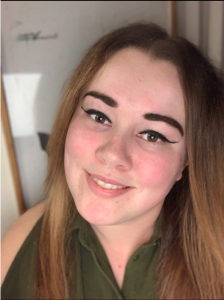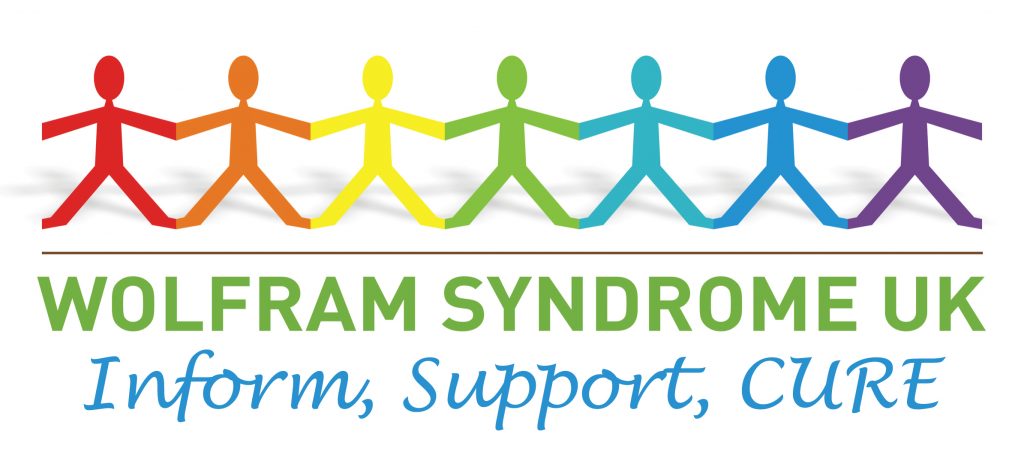A blog piece that was written for Genetic Disorders UK March 2017 by WSUK’s CEO/Co-Founder Tracy Lynch.
Little did I know that Mother’s Day, 18th March 2007, would be the start to my life and that of my family changing completely!
My daughter Jennifer, then aged 5, had an eye check with the local optician as we had some concerns regarding her vision. We were told that she was long sighted, nothing too major, but she also had Nystagmus, or as the Americans like to call it ‘Dancing Eyes’. It wasn’t noticeable and there was no explanation why she had it. This needed exploring and so began 3 years of tests and numerous trips to Great Ormond Street Hospital (GOSH), almost every month, to try to find the root cause of the Nystagmus. During these 3 years Jennifer was also diagnosed with a neurogenic bladder (too small for her age) and Type 1 Diabetes. When we got that diagnosis our lives completely changed! It felt like we were going through a period of grief. We could no longer be spontaneous with our plans and days out. We had to plan where we were going to be for meal times and snack times; and had to learn to inject our 6 year old daughter with insulin. This wasn’t something we had ever envisaged doing. There was no history of it in the family after all.
On 17th March 2010, just 3 days after Mother’s Day we received our 3rd life changing moment. My husband, Paul, Jennifer and I were taken into a room at GOSH by 2 of her consultants and given the news that Jennifer had a rare progressive condition called Wolfram Syndrome (WS). They couldn’t tell us anything about it as they knew nothing, they just handed us 2 pieces of A4 paper with a print out from a world wide support group and some information about a doctor in the UK that was researching the condition. That was it!
The first few weeks were pretty dark for us, but for Jennifer’s sake and that of her 2 older brothers we had to keep positive. We did online research to try to find some support and anyone that knew anything about WS. We joined the worldwide support group as a starting point but just felt so frustrated that there was nothing else to help us. We felt that we needed to do something, so we contacted Professor Barrett at Birmingham Children’s Hospital who was researching this condition and explained that we wanted to start a support group in the UK and would he help us by providing the correct medical information about WS. This helped us to focus and to start feeling a bit more positive as we were doing something to help us and the few other affected families we knew about in the UK. The whole family became involved as we started fundraising towards research by becoming involved with another charity, WellChild, who were supporting Professor Barrett’s work at that time.
To give you some facts about Wolfram Syndrome – it is a rare progressive, neurodegenerative genetic condition. The main features are Type 1 diabetes, Diabetes Insipidus (water diabetes affecting the bladder), Optic Atrophy (death of the optic nerve causing sight loss) and deafness. It can also cause anxiety, depression, sometimes aggression, as well as other neurological problems, loss of gag reflex and respiratory issues. It is a life shortening condition. We know of about 100 people total, adults and children who are diagnosed with WS. There is no cure and currently no treatment but a clinical drug trial is due to start later this year. This is everyone’s candle of light, our beacon of hope!
Life is certainly not easy, especially as 5 years ago we had yet another change in our lives when Jennifer had to have a ‘temporary’ Tracheostomy tube inserted following a severe choking attack requiring a spell of 3 weeks on a ventilator and this was the only way to get her off it safely. Following this I had to give up my job as a part time accounts assistant and become her full time Carer. This isn’t easy as many of you full time carers, especially with teenagers will know. Apart from when she is at school I am with Jennifer 24/7. She can’t be left alone at home as her tube might need clearing and she is unable to do this herself as she is vision impaired, registered Severely Vision Imapired. That is another frustration as she can’t go out by herself.
Since the trachy was put in she has changed mentally. She was always a bit ‘stressy’ but even more so now and never wants to go out Her dad does help out in the evenings and weekends when she is an absolute angel for him! With me I get the teenager from hell. We clash so much as we are both so alike being very strong willed and stubborn. This is great in a way for Jennifer as I know that she will fight for what she wants. It just gets very wearing when you are faced with it all the time. In the times when I get lovely Jennifer it is wonderful! She has a very dry sense of humour, she is very arty and is producing some lovely pieces which we are very proud of and tell her so. This of course helps boost her confidence. She loves playing jokes on her dad and keeping fun secrets from us. These are the times that I as her mum treasure. These are the times that life seems normal. We don’t see her as a girl that wears glasses, requires a white cane, has to have her blood glucose checked and injections 4 times a day and has a piece of white plastic sticking out of her neck but as our special daughter. We try to keep life happy and positive for her and her brothers. There is no point in worrying about what is going to happen 2 years, 5 years down the line. We just need to focus on the here and now. I don’t always have the daughter that I love facing me every day but I know that deep down inside she is there trying to get out but for this condition.
Would I have my life any other way? I don’t know. It might not be as frenetic but would I be as happy as I am. Mother’s Day this year will be spent flying back from a meeting in Italy where I am giving a presentation about being the mother of a child with WS and then hopefully being taken out for a slightly late lunch, once I land, and to be given a card that I know Jennifer has secretly made for me. If only she could learn to whisper quietly!
















 One of our members, George Jones suffers from this rare genetic disorder. Our sum of £800 which was raised will go to the charity to help support and fund them to increase awareness of this syndrome but also to provide more research.
One of our members, George Jones suffers from this rare genetic disorder. Our sum of £800 which was raised will go to the charity to help support and fund them to increase awareness of this syndrome but also to provide more research. The road soon inclined again with a steep climb out of Winsford via Ash lane heading towards Withypool. At Withypool it was time for a pit stop, where they were welcomed by Tony and Anita into the Tea rooms for a refuel, ready for the next step of the journey which was up Kiteridge Lane out onto Bradymoor, Pickedstone Plantation where they then followed the river up through to Simonsbath.
The road soon inclined again with a steep climb out of Winsford via Ash lane heading towards Withypool. At Withypool it was time for a pit stop, where they were welcomed by Tony and Anita into the Tea rooms for a refuel, ready for the next step of the journey which was up Kiteridge Lane out onto Bradymoor, Pickedstone Plantation where they then followed the river up through to Simonsbath.

